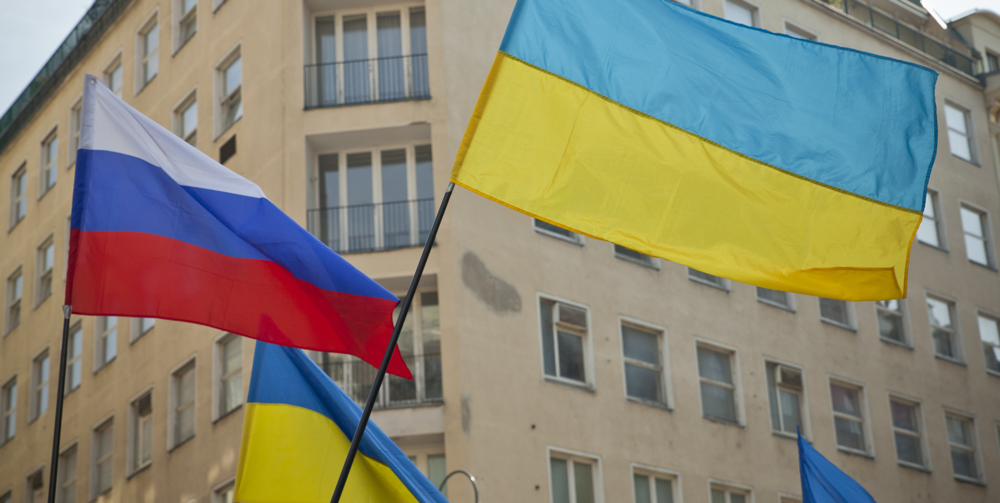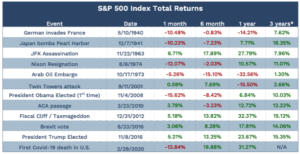Russia Invades Ukraine: Feb. 2022 Market Flash

The waiting is over. After weeks of wondering whether Russia will invade Ukraine, we have our answer. Russia invaded Ukraine overnight in what’s been called, “the most significant military campaign in Europe since WWII.”[1] As a result, stock markets around the world are plummeting and energy prices are soaring. At the time of this writing, WTI Crude Index is up over 8% and the EuroStoxx 50 Index is down -5%.[2]
Sadly, the situation is likely to be a humanitarian crisis with many innocent lives lost and scores of Ukrainians displaced. In addition, this will be disruptive to the global economy. The most direct impact will be higher energy and food prices as Russia is a significant exporter. While battling the already high inflation rates, the current invasion threatens to exacerbate the inflation problem at least in the short term.
As financial advisors, the question we must always answer is, “what should an investor do?”
What to Do
Unfortunately, we believe the correct answer is usually unsatisfying. While we believe the events will have long-term implications, we also believe the Russian invasion should be treated as short-term market noise for now. We believe investors should stick to their long-term financial plan and not make drastic portfolio adjustments based on overnight events.
We anticipate the market ride will not be easy and expect indiscriminate selling across global equity markets, a strong surge in energy and food prices, and a flock to safe assets such as U.S. Treasury Bonds.
Investors should be prepared for volatile swings in the equity part of their account.
What to Consider
However, we believe it helps to step back and take a long-term perspective at times like this. There have been numerous troubling historical events in the past 100 years. Investors naturally worry about the market impact of a perceived crisis.
While every situation differs and past performance is no guarantee of future results, markets often decline in the aftermath of negative geopolitical events before resuming the long-term upward trend of the stock market.
The table below shows several notable events and S&P 500 Index Returns, 1 month, 6 months, 1 year, and 3 years after the event.

Source: Bloomberg Finance LP, Wikipedia *3-year returns are annualized
While taking a long-term perspective, we do not dismiss the significance of the Russian invasion. We believe there are potentially significant, long-term investment implications that will take years to play out.
This event likely marks the end of the Post-Cold War era. We should expect a more polarized world with Russia and China on one side and the United States and Western Allies on the other. Potential long-term investment implications include significant changes to energy markets and increased spending for defense. The Curi Capital Investment Committee will have no shortage of topics discuss at the next meeting.
Final Takeaways
Two final points to emphasize: First, as long-term investors, we care about long-term changes that take time to play out. We have time to make any necessary portfolio adjustments and long-term decisions should not be made in the middle of a crisis.
Second, while we didn’t know Russia was going to invade yesterday, we plan for disruptive market events ahead of time. We consistently remind that market sell-offs will occur and position portfolios for volatility through diversification by putting together portfolios with different investments that don’t all move in the same direction. Days like this are when we’re thankful for typically underwhelming assets like bonds.
Should you have any questions about your portfolio or are unsure your portfolio is setup to weather market volatility (or, more importantly, to achieve your long-term goals), please reach out to a member of the Curi Capital team at 984-202-2800
Please note: This material should not be considered a recommendation to buy or sell securities or a guarantee of future results. Curi Capital is a registered investment advisor. Registration does not imply a certain level of skill or training. More information about Curi Capital can be found in its Form ADV Part 2, which is available upon request.
Past performance is not a guarantee of future results. All investment strategies involve risk and have the potential for profit or loss; changes in investment strategies, contributions, or withdrawals may materially alter the performance and results of a portfolio. Different types of investments involve varying degrees of risk, and there can be no assurance that any specific investment will be suitable or profitable for a client’s investment portfolio. References to indexes and benchmarks are hypothetical illustrations of aggregate returns and do not reflect the performance of any actual investment. Investors cannot invest in an index and indexes do not reflect the deduction of the advisor’s fees or other trading expenses.
[1] Laperriere, Andy. Piper Sandler. 24 February 2022. “The End of The Post-Cold War Era.”
[2] Source: Bloomberg Finance, LP



